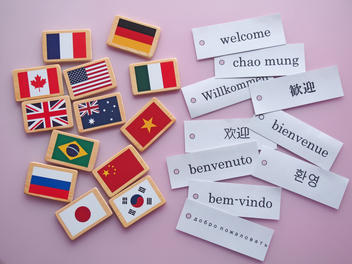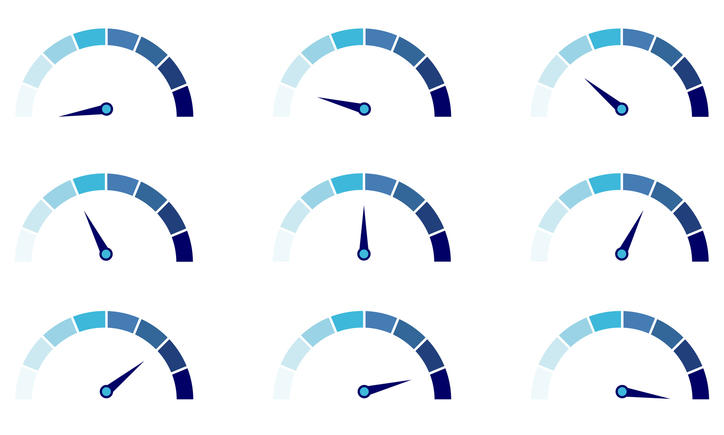The "Bienvenue en France" label highlights concrete actions that affect the everyday lives of international students. However, the label is not an indicator of the quality of the institution itself (e.g. its educational programs, strategy, or international locations). It simply allows international students to evaluate an institution on the basis of the facilities that are set up to provide them with the best possible welcome.
Structure of the "Bienvenue en France" label
There are five categories, each broken down into four criteria. Some criteria are considered vital to making sure the student immediately feels at ease. These are referred to as "Welcome Package" criteria.
The label is available in three levels, awarded in accordance with the total number of criteria fulfilled by the institution, with special consideration given to "Welcome Package" criteria. Particular attention is also paid to the quality of each criterion that is met.
Due to their nature and existing facilities, doctoral studies do not qualify for the "Bienvenue en France" label. However, institutions are encouraged to highlight any initiatives and measures they may take to welcome new international doctoral students.
The "Bienvenue en France" label is awarded at three levels.
- Level 1: The institution meets 10 criteria, including 8 "Welcome Package" criteria.
- Level 2: The institution meets 15 criteria, including 12 "Welcome Package" criteria.
- Level 3: The institution meets all the criteria.
The institution's "Bienvenue en France" label indicates the level that was achieved.
Categories and criteria of the "Bienvenue en France" label
1. Quality and accessibility of information
1.1 A multilingual website (Welcome Package criterion)
Most of the institution's website (in particular, those pages related to student life and educational programs) is at least translated into English. Otherwise, the institution has a separate website for international students, also translated at least into English.
1.2 Clear presentation of educational programs and diplomas (Welcome Package criterion)
All programs on offer are described accurately and clearly. The same goes for the legal nature of the diplomas that are awarded, their ability to pave the way to further education, and their recognition by employers.
1.3 Digitization of application and administrative procedures throughout the entire program (Welcome Package criterion)
The institution is connected to the "Études en France" platform or manages the applications of international students online. It develops a "virtual office" allowing students to create an online account and manage their study program electronically (certificates, transcripts, etc.).
1.4 Accessibility of digital tools
The institution has a Wi-Fi network that covers the majority of its classrooms, libraries, and living areas. Computer rooms are available to students without laptops. Students can scan and print documents in these rooms or via the network.
2. Quality and accessibility of welcome facilities
2.1 Multi-service reception desk (Welcome Package criterion)
The institution participates in a shared multi-service reception area or develops its own desk with local partners (prefecture, OFII, CROUS, Action Logement, CPAM, university health and preventive medicine services, CAF, SNCF, local transportation operators, etc.).
2.2 Welcome booklet (Welcome Package criterion)
The institution provides international students with a comprehensive welcome booklet that includes an overview of the area, school facilities, and cultural and athletic offerings, as well as a calendar of campus activities and the details of everyday services. This booklet is translated into English (at the very least) and sent to the student before their departure or upon arrival in France.
2.3 Welcome services (Welcome Package criterion)
The institution provides services (free or paid) to improve the experience of new students and facilitate their integration (intensive French language course, pick-up at the airport or train station, and partnerships with banks, cultural institutions, public transportation, etc.). The institution may also offer these services by way of a third-party provider. At the very least, the institution offers the student a free public transportation pass for the first 48 hours, and if possible for the first week.
2.4 Back to school and integration activities (Welcome Package criterion)
The institution organizes orientation and integration events for international students, if possible in the form of a special "integration week" involving the whole community.
3. Course accessibility and assistance
3.1 Courses offered in English
The institution develops and promotes an educational program in English, whether for all students or solely for international students. This program is regularly updated in Campus France's "Taught in English" course catalog.
3.2 Preparatory programs and follow-up
The institution uses digital technology to offer remote preparation before some of its diploma programs or methodological follow-up after these same programs. It also develops a program allowing for in-class preparation and follow-up.
3.3 Development of a digital space
The institution uses digital technology to allow teachers to put their courses and/or course materials online. Students can interact with their teachers remotely. The institution also offers a variety of online resources, in particular informational documents and language courses.
3.4 French as a foreign language (FLE) (Welcome Package criterion)
The school offers FLE (French as a Foreign Language) training to international students at the school's own FLE center, which has been awarded the Qualité FLE label or is a member of the ADCUEFE. Otherwise, the courses are held at a FLE center that has received the Qualité FLE label or is a member of the ADCUEFE on the same site. Sometimes the FLE offer is provided by part-time lecturers.
4. Housing and quality of campus life
4.1 International and/or orientation service offered by multilingual staff for international students (Welcome Package criterion)
The institution has an international relations department and/or an orientation service for international students. The staff is able to welcome the students in English (at least). The institution provides the telephone numbers and email addresses of contact people that international students can contact in the event of questions and commits to answering all inquiries quickly.
4.2 Housing (Welcome Package criterion)
The institution has a department (or at least one unit) dedicated to housing new international students. It also has a network of local partners (public and private landlords, associations, housing agencies, etc.). It may include housing listings on its website. It reserves several CROUS housing units for international students from both inside and outside the EU.
4.3 Student mobilization and support for international students (Welcome Package criterion)
The institution develops a digital platform allowing new students to connect with other students and promotes existing "buddy systems." It works with student associations to organize orientation and sponsorship events. Students who assist with the orientation of new international students may be eligible for European credits (ECTS). Throughout the year, the institution holds cultural, athletic, and festive events to promote and highlight the multicultural nature of its student community. It organizes activities to raise awareness among the community and calls upon student associations to develop new projects.
4.4 Contacts for international students (Welcome Package criterion)
The institution designates at least one "international student contact person" in each of its departments. These points of contact (administrators, professors, etc.) are clearly identified, accessible to international students on a daily basis, and committed to answering inquiries quickly. The institution also provides access to a social worker and a psychologist, if needed.
5. Quality of follow-up after graduation
5.1 Bridge to employment (Welcome Package criterion)
As part of its commitments, the institution puts international students in touch with companies and organizations in its region and helps them obtain student jobs or internships. A "young ambassadors" program may also be set up with the same companies and organizations.
5.2 Entrepreneurship assistance
The institution offers entrepreneurship assistance and training programs to international students and, if possible, helps them join incubation programs specific to the institution or site.
5.3 Maintenance of a network of former international students
The institution has at least one updated profile on the "France Alumni" platform. It also integrates international students into its own alumni network, which hosts both virtual and in-person events.
5.4 Statistical and qualitative follow-up of registered international students, including measures of success
The institution is able to complete statistical and qualitative surveys from MESRI and Campus France regarding its international students and tracks the progress of these students after graduation.
Related contents
Recommended items






















































